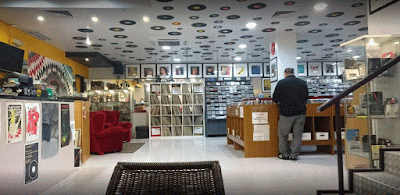 |
This is not the actual pile of records I bought. Warning: having this many records is hazardous to your health and will likely void your lease. Side effects may include vertigo and disorientation. |
But here is the problem: When I buy records, I have a regular process of cleaning, cataloging, and listening to the new titles. And when it comes to jazz albums, I also like to spend some time learning more about the sessions, the musicians, maybe comparing different pressings, and reading reviews of the music. Naturally, all of that takes some time.
 |
The actual pile of new and used records waiting to be processed. |
The obvious solution is to quit buying so many records. (Though I have to admit that those words in that order don't even make sense to me.) I won't live long enough to listen to all the records I already have, so what's the point of buying more? The answer, of course, is that no matter what you collect -- LPs, stamps, coins, comic books, baseball cards, wine, or whatever -- the fun isn't just in having a big honking pile of whatever it is you like to collect. It's enjoying and appreciating what you have, while adding new and interesting items. And like most collectors, I love the thrill of the chase -- hunting down obscure releases online, stumbling on an original Blue Note at a yard sale, or maybe discovering a new artist that I've never heard of at the local antiques mall.

Recently at one of my local haunts, I found a 1973 album on the Atlantic label called In April Came The Dawning Of The Red Suns by a group named Ramatam. They put out two albums, the self-titled Ramatam in 1972, and In April in 1973. I have never heard of them in my life and am pretty certain that I've never, ever seen one of their albums before. How is that possible? Well, it turns out to be a very interesting album (despite the inclusion of a straight-up cover of Stars and Stripes Forever.) Plus, it has a great, oh so 1970s cover. How could I not buy it?
Back to our story. Despite grousing about having too many records (talk about your first world problems), I picked up a bunch of really interesting LPs during our travels this summer. While we were in Portugal and Spain, I hit eight or ten used record stores, on the lookout for European artists that I like, as well as some Brazilian albums that are either very hard to find or amazingly expensive in the U.S.
 |
| Louie Louie, in Lisbon |
Madrid, on the other hand, is overrun with excellent used record stores, including a half dozen that were within easy walking distance of where we were staying near the Palacio Real. Among the ones that I particularly liked were Bajoelvolcan, La Metralletta (despite their regrettable "machine gun" name, with matching logo), as well as Discos Babel and Discos Bangla Desh. The last two are side-by-side on a street behind Opera Square.
 |
Discos Bangla Desh on the left, and Babel Discos on the right |
Finally, at a Madrid branch of the FNAC store (a French-based home electronics chain), they were practically giving away brand new re-pressings of classic jazz LPs from the 50s and 60s. There are a slew of EU companies putting out these reprints, including Wax Time, Pan Am, DOL, Doxy, and Barcelona's own Jazz Wax label. No doubt you've run across some of these if you've spent any time looking at jazz LPs in the last few years. There is some discussion about the quality of these pressings, as well as questions about whether the companies are taking unfair advantage of lax European copyright laws to re-press albums that are still under copyright in the U.S. Even if the later is true, as far as I know these records are perfectly legal to buy and own and are widely sold in the U.S. on Amazon and elsewhere. As I wrote in my post about Rhino/Scorpio Blue Note re-pressings, as long as you know what you're buying (albums that are likely cut from digital files), it's hard to argue with brand new classic jazz albums that cost $10-12.
 |
La Metralletta in Madrid |
In my trips to New York and Nashville, I was mostly disappointed with the shops that I visited. I bought a few things, but overall -- and not surprisingly -- it seems that shops in big U.S. cities are more expensive and more picked over. Since there is less competition, I tend to find more interesting records (and at much better prices) in record shops and antique stores in smaller cities and towns.
Above is a small selection of the haul from our Spain and Portugal trip.
Enjoy the music!











































